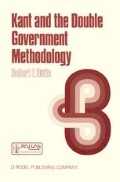Abstract
We have now seen enough of the details of Kant’s attempt to constitute a world of experience that can be studied by the direct means accorded by our own human cognitive resources. It is a world in which space and time function as real contexts of experience, contexts provided by the grammar of sensibility. It is a world in which substance, cause and like categories organize sense-givens into objects determined in ways that allow us to know ever more of the inexhaustible features of those givens. The categories and space and time as forms of sensuous intuition impose ‘Nature’ upon things; they demand regularity and anticipation of ordered structures. The schemata and the construction rules of mathematics make this demand and this anticipation capable of fulfillment. The world of objects available for study by application of the mechanical method is a humanly constructed world, the only world that can be real for us. Gone from this world are Leibniz’s ideal space and time; gone his objects of sense as confused perceptions. Gone also are the angels, or perhaps Kant has only brought them back to earth.
The act of perception can be understood only as that of a subject who locates himself at a particular place and time in the world and as part of it. But this ‘it’ is treacherous. In one sense of course I cannot but experience myself as in the world. But this does not mean that the world is even being conceived as, let alone appears as, an object such as a room, sandpit, or castle. An object is something which is distinguishable or limitable in some way or another. But no limits of the world enter our experience. Instead of a limit we have a horizon. This is a limit in one sense, but only the limit for me where I am.... The world of any cosmology is an object on one of the horns of the First Antinomy: either finite or an actual infinite. But the world of the manifest image is Kant’s phenomenal world, neither finite nor infinite, but what Yvon Gauthier has baptized ‘affinité’: eine unendliche Aufgabe, existing only insofar as it has been constituted in experience, forever incomplete.
Bas van Fraassen, “On the Radical Incompleteness of the Manifest Image”, PSA 1976 (Vol II)
Access this chapter
Tax calculation will be finalised at checkout
Purchases are for personal use only
Preview
Unable to display preview. Download preview PDF.
Author information
Authors and Affiliations
Rights and permissions
Copyright information
© 1986 D. Reidel Publishing Company, Dordrecht, Holland
About this chapter
Cite this chapter
Butts, R.E. (1986). Kant’s DGM: Two Fundamental Principles of Methodology. In: Kant and the Double Government Methodology. The Western Ontario Series in Philosophy of Science, vol 24. Springer, Dordrecht. https://doi.org/10.1007/978-94-009-6393-1_8
Download citation
DOI: https://doi.org/10.1007/978-94-009-6393-1_8
Publisher Name: Springer, Dordrecht
Print ISBN: 978-90-277-2384-0
Online ISBN: 978-94-009-6393-1
eBook Packages: Springer Book Archive

